#decentralized social network developers
Explore tagged Tumblr posts
Text

#JOIN THE FEDIVERSE#pixelfed#fediverse#android#app development#social networks#activitypub#decentralized#fedi#links
2 notes
·
View notes
Text
Aslı Aydıntaşbaş for Politico Magazine:
American democracy is about to undergo a serious stress test. I know how it feels, in part because I lived through the slow and steady march of state capture as a journalist working in Recep Tayyip Erdoğan’s Turkey. Over a decade as a high-profile journalist, I covered Turkey’s descent into illiberalism, having to engage in the daily push and pull with the government. I know how self-censorship starts in small ways but then creeps into operations on a daily basis. I am familiar with the rhythms of the battle to reshape the media, state institutions and the judiciary. Having lived through it, and having gathered some lessons in hindsight, I believe that there are strategies that can help Democrats and Trump critics not only survive the coming four years, but come out stronger. Here are six of them.
1. Don’t Panic — Autocracy Takes Time
President-elect Donald Trump’s return to power is unnerving but, as I have argued previously, America will not turn into a dictatorship overnight — or in four years. Even the most determined strongmen face internal hurdles, from the bureaucracy to the media and the courts. It took Erdoğan well over a decade to fully consolidate his power. Hungary’s Viktor Orbán and Poland’s Law and Justice Party needed years to erode democratic norms and fortify their grip on state institutions.
I am not suggesting that the United States is immune to these patterns, but it’s important to remember that its decentralized system of governance — the network of state and local governments — offers enormous resilience. Federal judges serve lifetime appointments, states and governors have specific powers separate from those granted federally, there are local legislatures, and the media has the First Amendment as a shield, reinforced by over a century of legal precedents. Sure, there are dangers, including by a Supreme Court that might grant great deference to the president. But in the end, Donald Trump really only has two years to try to execute state capture. Legal battles, congressional pushback, market forces, midterm elections in 2026 and internal Republican dissent will slow him down and restrain him. The bottom line is that the U.S. is too decentralized in its governance system for a complete takeover. The Orbánization of America is not an imminent threat.
2. Don’t Disengage — Stay Connected
[...]
Nothing is more meaningful than being part of a struggle for democracy. That’s why millions of Turks turned out to the polls and gave the opposition a historic victory in local governments across Turkey earlier this year. That’s how the Poles organized a winning coalition to vote out the conservative Law and Justice Party last year. It can happen here, too. The answer to political defeat is not to disconnect, but to organize. You can take a couple of days or weeks off, commiserate with friends and mute Elon Musk on X — or erase the app altogether. But in the end, the best way to develop emotional resilience is greater engagement.
[...]
4. Charismatic Leadership Is a Non-Negotiable
One lesson from Turkey and Hungary is clear: You will lose if you don’t find a captivating leader, as was the case in 2023 general elections in Turkey and in 2022 in Hungary. Coalition-building or economic messaging is necessary and good. But it is not enough. You need charisma to mobilize social dissent. [...]
Last year’s elections in Poland and Turkey showcased how populist incumbents can be defeated (or not defeated, as in general elections in Turkey in 2023) depending on the opposition’s ability to unite around compelling candidates who resonate with voters. Voters seek authenticity and a connection — give it to them.
5. Skip the Protests and Identity Politics
Soon, Trump opponents will shake off the doldrums and start organizing an opposition campaign. But how they do it matters. For the longest time in Turkey, the opposition made the mistake of relying too much on holding street demonstrations and promoting secularism, Turkey’s version of identity politics, which speaks to the urban professional and middle class but not beyond. [...]
6. Have Hope
Nothing lasts forever and the U.S. is not the only part of the world that faces threats to democracy — and Americans are no different than the French, the Turks or Hungarians when it comes to the appeal of the far right. But in a country with a strong, decentralized system of government and with a long-standing tradition of free speech, the rule of law should be far more resilient than anywhere in the world. Trump’s return to power certainly poses challenges to U.S. democracy. But he will make mistakes and overplay his hand — at home and abroad. America will survive the next four years if Democrats pick themselves up and start learning from the successes of opponents of autocracy across the globe.
Aslı Aydıntaşbaş, who had first-hand experience with Recep Tayyip Erdoğan’s authoritarianism in her native Turkey as a journalist, wrote in Politico Magazine on how to effectively fight Donald Trump’s authoritarian impulses.
#Donald Trump#Viktor Orbán#Recep Tayyip Erdoğan#Trumpism#Right Wing Populism#Authoritarianism#Aslı Aydıntaşbaş#Politico Magazine#Politico
323 notes
·
View notes
Text
The Metaverse: A New Frontier in Digital Interaction

The concept of the metaverse has captivated the imagination of technologists, futurists, and businesses alike. Envisioned as a collective virtual shared space, the metaverse merges physical and digital realities, offering immersive experiences and unprecedented opportunities for interaction, commerce, and creativity. This article delves into the metaverse, its potential impact on various sectors, the technologies driving its development, and notable projects shaping this emerging landscape.
What is the Metaverse?
The metaverse is a digital universe that encompasses virtual and augmented reality, providing a persistent, shared, and interactive online environment. In the metaverse, users can create avatars, interact with others, attend virtual events, own virtual property, and engage in economic activities. Unlike traditional online experiences, the metaverse aims to replicate and enhance the real world, offering seamless integration of the physical and digital realms.
Key Components of the Metaverse
Virtual Worlds: Virtual worlds are digital environments where users can explore, interact, and create. Platforms like Decentraland, Sandbox, and VRChat offer expansive virtual spaces where users can build, socialize, and participate in various activities.
Augmented Reality (AR): AR overlays digital information onto the real world, enhancing user experiences through devices like smartphones and AR glasses. Examples include Pokémon GO and AR navigation apps that blend digital content with physical surroundings.
Virtual Reality (VR): VR provides immersive experiences through headsets that transport users to fully digital environments. Companies like Oculus, HTC Vive, and Sony PlayStation VR are leading the way in developing advanced VR hardware and software.
Blockchain Technology: Blockchain plays a crucial role in the metaverse by enabling decentralized ownership, digital scarcity, and secure transactions. NFTs (Non-Fungible Tokens) and cryptocurrencies are integral to the metaverse economy, allowing users to buy, sell, and trade virtual assets.
Digital Economy: The metaverse features a robust digital economy where users can earn, spend, and invest in virtual goods and services. Virtual real estate, digital art, and in-game items are examples of assets that hold real-world value within the metaverse.
Potential Impact of the Metaverse
Social Interaction: The metaverse offers new ways for people to connect and interact, transcending geographical boundaries. Virtual events, social spaces, and collaborative environments provide opportunities for meaningful engagement and community building.
Entertainment and Gaming: The entertainment and gaming industries are poised to benefit significantly from the metaverse. Immersive games, virtual concerts, and interactive storytelling experiences offer new dimensions of engagement and creativity.
Education and Training: The metaverse has the potential to revolutionize education and training by providing immersive, interactive learning environments. Virtual classrooms, simulations, and collaborative projects can enhance educational outcomes and accessibility.
Commerce and Retail: Virtual shopping experiences and digital marketplaces enable businesses to reach global audiences in innovative ways. Brands can create virtual storefronts, offer unique digital products, and engage customers through immersive experiences.
Work and Collaboration: The metaverse can transform the future of work by providing virtual offices, meeting spaces, and collaborative tools. Remote work and global collaboration become more seamless and engaging in a fully digital environment.
Technologies Driving the Metaverse
5G Connectivity: High-speed, low-latency 5G networks are essential for delivering seamless and responsive metaverse experiences. Enhanced connectivity enables real-time interactions and high-quality streaming of immersive content.
Advanced Graphics and Computing: Powerful graphics processing units (GPUs) and cloud computing resources are crucial for rendering detailed virtual environments and supporting large-scale metaverse platforms.
Artificial Intelligence (AI): AI enhances the metaverse by enabling realistic avatars, intelligent virtual assistants, and dynamic content generation. AI-driven algorithms can personalize experiences and optimize virtual interactions.
Wearable Technology: Wearable devices, such as VR headsets, AR glasses, and haptic feedback suits, provide users with immersive and interactive experiences. Advancements in wearable technology are critical for enhancing the metaverse experience.
Notable Metaverse Projects
Decentraland: Decentraland is a decentralized virtual world where users can buy, sell, and develop virtual real estate as NFTs. The platform offers a wide range of experiences, from gaming and socializing to virtual commerce and education.
Sandbox: Sandbox is a virtual world that allows users to create, own, and monetize their gaming experiences using blockchain technology. The platform's user-generated content and virtual real estate model have attracted a vibrant community of creators and players.
Facebook's Meta: Facebook's rebranding to Meta underscores its commitment to building the metaverse. Meta aims to create interconnected virtual spaces for social interaction, work, and entertainment, leveraging its existing social media infrastructure.
Roblox: Roblox is an online platform that enables users to create and play games developed by other users. With its extensive user-generated content and virtual economy, Roblox exemplifies the potential of the metaverse in gaming and social interaction.
Sexy Meme Coin (SEXXXY): Sexy Meme Coin integrates metaverse elements by offering a decentralized marketplace for buying, selling, and trading memes as NFTs. This unique approach combines humor, creativity, and digital ownership, adding a distinct flavor to the metaverse landscape. Learn more about Sexy Meme Coin at Sexy Meme Coin.
The Future of the Metaverse
The metaverse is still in its early stages, but its potential to reshape digital interaction is immense. As technology advances and more industries explore its possibilities, the metaverse is likely to become an integral part of our daily lives. Collaboration between technology providers, content creators, and businesses will drive the development of the metaverse, creating new opportunities for innovation and growth.
Conclusion
The metaverse represents a new frontier in digital interaction, offering immersive and interconnected experiences that bridge the physical and digital worlds. With its potential to transform social interaction, entertainment, education, commerce, and work, the metaverse is poised to revolutionize various aspects of our lives. Notable projects like Decentraland, Sandbox, Meta, Roblox, and Sexy Meme Coin are at the forefront of this transformation, showcasing the diverse possibilities within this emerging digital universe.
For those interested in the playful and innovative side of the metaverse, Sexy Meme Coin offers a unique and entertaining platform. Visit Sexy Meme Coin to explore this exciting project and join the community.
274 notes
·
View notes
Text
Microblogging platform Mastodon is taking steps to make sure it never falls into the hands of some MAGA billionaire like Zuck or Musk.
Founder Eugen Rochko is transferring ownership to a nonprofit entity based in Europe. It is already located in the EU where it is free of any political or legal pressure from a Trump administration. Becoming nonprofit is a poison pill to deter any broligarchs who bend the knee to MAGA.
Mastodon announced Monday that it's shifting its structure over the next six months to become wholly owned by a European nonprofit organization—"affirming the intent that Mastodon should not be owned or controlled by a single individual." This takes control of the social network away from its previous "ultimate decision-maker," Eugen Rochko. As founder, Rochko initially took the reins to ensure the decentralized platform would never be for sale and "would be free of the control of a single wealthy individual." His grand vision remains to leave Mastodon users in control of the social network, making their own decisions about what content is allowed or what appears in their timelines. The news comes after leaders of other social networks, like Mark Zuckerberg and Elon Musk, have sparked backlash over sudden changes to popular apps like Facebook, Instagram, and X (formerly Twitter). For years, Musk has drawn criticism for changing Twitter's hate speech policies through his X rebranding. And more recently, Zuckerberg this month defended Meta's decision to relax hate speech policies (permitting women to be called "property" and gay people to be called "mentally ill") by calling bans on such speech "out of touch with mainstream discourse." Mastodon is hoping to provide an alternative social network for users who are potentially frustrated with their lack of control over their timelines and content on other networks.
Mastadon is part of the Fediverse – which takes a little getting used to. And while not small, it doesn't yet have the enormous volume of broligarch-owned social media; though Elon Musk's transformation of Twitter/X into a playground for Nazis and Trumpsters has sparked growth at Mastodon.
Mastodon appears to be betting that even more users will seek alternative social networks in the future as popular apps enact unpopular policies. The blog discussed progress on a "privacy-respecting search tool" that could be used to explore the entire Fediverse, a collection of independent social media networks that Mastodon connects to. That could make it possible to discover more content without depending on a "For You" algorithm mining user data. And perhaps in a nod to Meta's recent changes, Mastodon also vowed to "invest deeply in trust and safety" and ensure "everyone, especially marginalized communities," feels "safe" on the platform.
Dominic Preston at The Verge writes...
“When founder Eugen Rochko started working on Mastodon, his focus was on creating the code and conditions for the kind of social media he envisioned,” Mastodon says. “The legal setup was a means to an end, a quick fix to allow him to continue operations. From the start, he declared that Mastodon would not be for sale and would be free of the control of a single wealthy individual, and he could ensure that because he was the person in control, the only ultimate decision-maker.” In the short term, nothing should change for users. Mastodon will continue to host the mastodon.social and mastodon.online servers and support its federated network. Routine code development and bug fixes are ongoing, though the announcement adds that “changes are definitely in the pipeline.” “Our core mission remains the same: to create the tools and digital spaces where people can build authentic, constructive online communities free from ads, data exploitation, manipulative algorithms or corporate monopolies,” Mastodon says.
What's not to like about a platform for Twitter refugees which doesn't Zuck?
#mastodon#microblogging#fediverse#eu#nonprofit#eugen rochko#twiter/x#elon musk#leave twitter#delete twitter#quit twitter#social media
47 notes
·
View notes
Text
TikTok alternative backed by Mark Cuban: Skylight Social
The AT Protocol (Authenticated Transfer Protocol) is a decentralized social networking protocol developed by Bluesky, with the goal of giving users more control over their online identity, data, and social interactions.
#tiktok#tiktok alternative#mark cuban#investing#investment#politics#political#us politics#news#donald trump#american politics#president trump#elon musk#jd vance#law
32 notes
·
View notes
Text
Pluto in Aquarius: Brace for a Business Revolution (and How to Ride the Wave)
The Aquarian Revolution
Get ready, entrepreneurs and financiers, because a seismic shift is coming. Pluto, the planet of transformation and upheaval, has just entered the progressive sign of Aquarius, marking the beginning of a 20-year period that will reshape the very fabric of business and finance. Buckle up, for this is not just a ripple – it's a tsunami of change. Imagine a future where collaboration trumps competition, sustainability dictates success, and technology liberates rather than isolates. Aquarius, the sign of innovation and humanitarianism, envisions just that. Expect to see:
Rise of social impact businesses
Profits won't be the sole motive anymore. Companies driven by ethical practices, environmental consciousness, and social good will gain traction. Aquarius is intrinsically linked to collective well-being and social justice. Under its influence, individuals will value purpose-driven ventures that address crucial societal issues. Pluto urges us to connect with our deeper selves and find meaning beyond material gains. This motivates individuals to pursue ventures that resonate with their personal values and make a difference in the world.
Examples of Social Impact Businesses
Sustainable energy companies: Focused on creating renewable energy solutions while empowering local communities.
Fair-trade businesses: Ensuring ethical practices and fair wages for producers, often in developing countries.
Social impact ventures: Addressing issues like poverty, education, and healthcare through innovative, community-driven approaches.
B corporations: Certified businesses that meet rigorous social and environmental standards, balancing profit with purpose.
Navigating the Pluto in Aquarius Landscape
Align your business with social impact: Analyze your core values and find ways to integrate them into your business model.
Invest in sustainable practices: Prioritize environmental and social responsibility throughout your operations.
Empower your employees: Foster a collaborative environment where everyone feels valued and contributes to the social impact mission.
Build strong community partnerships: Collaborate with organizations and communities that share your goals for positive change.
Embrace innovation and technology: Utilize technology to scale your impact and reach a wider audience.
Pluto in Aquarius presents a thrilling opportunity to redefine the purpose of business, moving beyond shareholder value and towards societal well-being. By aligning with the Aquarian spirit of innovation and collective action, social impact businesses can thrive in this transformative era, leaving a lasting legacy of positive change in the world.
Tech-driven disruption
AI, automation, and blockchain will revolutionize industries, from finance to healthcare. Be ready to adapt or risk getting left behind. Expect a focus on developing Artificial Intelligence with ethical considerations and a humanitarian heart, tackling issues like healthcare, climate change, and poverty alleviation. Immersive technologies will blur the lines between the physical and digital realms, transforming education, communication, and entertainment. Automation will reshape the job market, but also create opportunities for new, human-centered roles focused on creativity, innovation, and social impact.
Examples of Tech-Driven Disruption:
Decentralized social media platforms: User-owned networks fueled by blockchain technology, prioritizing privacy and community over corporate profits.
AI-powered healthcare solutions: Personalized medicine, virtual assistants for diagnostics, and AI-driven drug discovery.
VR/AR for education and training: Immersive learning experiences that transport students to different corners of the world or historical periods.
Automation with a human touch: Collaborative robots assisting in tasks while freeing up human potential for creative and leadership roles.
Navigating the Technological Tsunami:
Stay informed and adaptable: Embrace lifelong learning and upskilling to stay relevant in the evolving tech landscape.
Support ethical and sustainable tech: Choose tech products and services aligned with your values and prioritize privacy and social responsibility.
Focus on your human advantage: Cultivate creativity, critical thinking, and emotional intelligence to thrive in a world increasingly reliant on technology.
Advocate for responsible AI development: Join the conversation about ethical AI guidelines and ensure technology serves humanity's best interests.
Connect with your community: Collaborate with others to harness technology for positive change and address the potential challenges that come with rapid technological advancements.
Pluto in Aquarius represents a critical juncture in our relationship with technology. By embracing its disruptive potential and focusing on ethical development and collective benefit, we can unlock a future where technology empowers humanity and creates a more equitable and sustainable world. Remember, the choice is ours – will we be swept away by the technological tsunami or ride its wave towards a brighter future?
Decentralization and democratization
Power structures will shift, with employees demanding more autonomy and consumers seeking ownership through blockchain-based solutions. Traditional institutions, corporations, and even governments will face challenges as power shifts towards distributed networks and grassroots movements. Individuals will demand active involvement in decision-making processes, leading to increased transparency and accountability in all spheres. Property and resources will be seen as shared assets, managed sustainably and equitably within communities. This transition won't be without its bumps. We'll need to adapt existing legal frameworks, address digital divides, and foster collaboration to ensure everyone benefits from decentralization.
Examples of Decentralization and Democratization
Decentralized autonomous organizations (DAOs): Self-governing online communities managing shared resources and projects through blockchain technology.
Community-owned renewable energy initiatives: Local cooperatives generating and distributing clean energy, empowering communities and reducing reliance on centralized grids.
Participatory budgeting platforms: Citizens directly allocate local government funds, ensuring public resources are used in line with community needs.
Decentralized finance (DeFi): Peer-to-peer lending and borrowing platforms, bypassing traditional banks and offering greater financial autonomy for individuals.
Harnessing the Power of the Tide:
Embrace collaborative models: Participate in co-ops, community projects, and initiatives that empower collective ownership and decision-making.
Support ethical technology: Advocate for blockchain platforms and applications that prioritize user privacy, security, and equitable access.
Develop your tech skills: Learn about blockchain, cryptocurrencies, and other decentralized technologies to navigate the future landscape.
Engage in your community: Participate in local decision-making processes, champion sustainable solutions, and build solidarity with others.
Stay informed and adaptable: Embrace lifelong learning and critical thinking to navigate the evolving social and economic landscape.
Pluto in Aquarius presents a unique opportunity to reimagine power structures, ownership models, and how we interact with each other. By embracing decentralization and democratization, we can create a future where individuals and communities thrive, fostering a more equitable and sustainable world for all. Remember, the power lies within our collective hands – let's use it wisely to shape a brighter future built on shared ownership, collaboration, and empowered communities.
Focus on collective prosperity
Universal basic income, resource sharing, and collaborative economic models may gain momentum. Aquarius prioritizes the good of the collective, advocating for equitable distribution of resources and opportunities. Expect a rise in social safety nets, universal basic income initiatives, and policies aimed at closing the wealth gap. Environmental health is intrinsically linked to collective prosperity. We'll see a focus on sustainable practices, green economies, and resource sharing to ensure a thriving planet for generations to come. Communities will come together to address social challenges like poverty, homelessness, and healthcare disparities, recognizing that individual success is interwoven with collective well-being. Collaborative consumption, resource sharing, and community-owned assets will gain traction, challenging traditional notions of ownership and fostering a sense of shared abundance.
Examples of Collective Prosperity in Action
Community-owned renewable energy projects: Sharing the benefits of clean energy production within communities, democratizing access and fostering environmental sustainability.
Cooperatives and worker-owned businesses: Sharing profits and decision-making within companies, leading to greater employee satisfaction and productivity.
Universal basic income initiatives: Providing individuals with a basic safety net, enabling them to pursue their passions and contribute to society in meaningful ways.
Resource sharing platforms: Platforms like carsharing or tool libraries minimizing individual ownership and maximizing resource utilization, fostering a sense of interconnectedness.
Navigating the Shift
Support social impact businesses: Choose businesses that prioritize ethical practices, environmental sustainability, and positive social impact.
Contribute to your community: Volunteer your time, skills, and resources to address local challenges and empower others.
Embrace collaboration: Seek opportunities to work together with others to create solutions for shared problems.
Redefine your own path to prosperity: Focus on activities that bring you personal fulfillment and contribute to the collective good.
Advocate for systemic change: Support policies and initiatives that promote social justice, environmental protection, and equitable distribution of resources.
Pluto in Aquarius offers a unique opportunity to reshape our definition of prosperity and build a future where everyone thrives. By embracing collective well-being, collaboration, and sustainable practices, we can create a world where abundance flows freely, enriching not just individuals, but the entire fabric of society. Remember, true prosperity lies not in what we hoard, but in what we share, and by working together, we can cultivate a future where everyone has the opportunity to flourish.
#pluto in aquarius#pluto enters aquarius#astrology updates#astrology community#astrology facts#astro notes#astrology#astro girlies#astro posts#astrology observations#astropost#astronomy#astro observations#astro community#business astrology#business horoscopes
122 notes
·
View notes
Text
Event Announcement!

Join FujoCoded at Escapade, the original slash slumber party with three decades of fannish history, in Los Angeles, CA from Jan. 31st to Feb. 2nd! Come chat with us about fandom, join our panels, and maybe even buy an exclusive new Fujoboard...
Want to attend in-person? There's still time to sign up!

You can also register for the upcoming online-only Escapade 35.5 or donate to help out this long-standing fandom tradition directly ($20 gets you access to the Escapade 35 Discord!)
@essential-randomness will be hosting 3 panels this year, all about a better fannish internet:
What's up with BlueSky (and decentralized social networks)?
The Fujoshi Guide to Web Development - Building a Fandom from Scratch
Personal Fannish Websites (co-hosted with Elf)
Finally, Escapade needs your help! Even if you can't attend, there are still tons of ways to chip in and help secure the future for this piece of fandom history. Spread the word, tell your friends!
And here's the exclusive Escapade FujoBoard.... under the cut!
See you in the vendor alley for this, our other merch, and maybe some more "exclusive merch" from Ms Boba's personal stash of samples!

25 notes
·
View notes
Text
Trump will overplay his hand. Be ready for when he does.
ROBERT REICH
JAN 2

Friends,
I sometimes share with you perspectives about what we’re up against from non-American writers and journalists. Asli Aydintasbas, a visiting fellow at the Brookings Institution in Washington D.C. and a former journalist, published this short essay recently in Politico Magazine. As we prepare for Trump’s regime, I thought you’d find her views useful.
***
American democracy is about to undergo a serious stress test. I know how it feels, in part because I lived through the slow and steady march of state capture as a journalist working in Recep Tayyip Erdoğan’s Turkey.
Over a decade as a high-profile journalist, I covered Turkey’s descent into illiberalism, having to engage in the daily push and pull with the government. I know how self-censorship starts in small ways but then creeps into operations on a daily basis. I am familiar with the rhythms of the battle to reshape the media, state institutions and the judiciary.
Having lived through it, and having gathered some lessons in hindsight, I believe that there are strategies that can help Democrats and Trump critics not only survive the coming four years, but come out stronger. Here are six of them.
1. Don’t Panic — Autocracy Takes Time
President-elect Donald Trump’s return to power is unnerving but America will not turn into a dictatorship overnight — or in four years. Even the most determined strongmen face internal hurdles, from the bureaucracy to the media and the courts. It took Erdoğan well over a decade to fully consolidate his power. Hungary’s Viktor Orbán and Poland’s Law and Justice Party needed years to erode democratic norms and fortify their grip on state institutions.
I am not suggesting that the United States is immune to these patterns, but it’s important to remember that its decentralized system of governance — the network of state and local governments — offers enormous resilience. Federal judges serve lifetime appointments, states and governors have specific powers separate from those granted federally, there are local legislatures, and the media has the First Amendment as a shield, reinforced by over a century of legal precedents.
Sure, there are dangers, including by a Supreme Court that might grant great deference to the president. But in the end, Donald Trump really only has two years to try to execute state capture. Legal battles, congressional pushback, market forces, midterm elections in 2026 and internal Republican dissent will slow him down and restrain him. The bottom line is that the U.S. is too decentralized in its governance system for a complete takeover. The Orbanization of America is not an imminent threat.
2. Don’t Disengage — Stay Connected
After a stunning electoral loss like this, there’s a natural impulse to shut off the news, log off social media and withdraw from public life. I’ve seen this with friends in Turkey and Hungary with opposition supporters retreating in disillusionment after Erdogan’s or Orbam’s victories. Understandably, people want to turn inwards.
Dancing, travel, meditation, book clubs — it’s all fine. But eventually, in Poland, Hungary and Turkey, opponents of autocracy have returned to the fight, driven by a belief in the possibility of change. So will Americans.
Nothing is more meaningful than being part of a struggle for democracy. That’s why millions of Turks turned out to the polls and gave the opposition a historic victory in local governments across Turkey earlier this year. That’s how the Poles organized a winning coalition to vote out the conservative Law and Justice Party last year. It can happen here, too.
The answer to political defeat is not to disconnect, but to organize. You can take a couple of days or weeks off, commiserate with friends and mute Elon Musk on X — or erase the app altogether. But in the end, the best way to develop emotional resilience is greater engagement.
3. Don’t Fear the Infighting
Donald Trump’s victory has understandably triggered infighting inside the Democratic Party and it looks ugly. But fear not. These recriminations and finger-pointing are necessary to move forward. In Turkey, Hungary and Poland, it was only after the opposition parties faced their strategic and ideological misalignment with society that they were able to begin to effectively fight back.
Trump has tapped into the widespread belief that the economic order, labor-capital relations, housing and the immigration system are broken. You may think he is a hypocrite, but there is no doubt that he has convinced a large cross-section of American society that he is actually the agent of change — a spokesman for their interests as opposed to “Democratic elites.” This is exactly what strongmen like Erdoğan and Orban have achieved.
For the Democratic Party to redefine itself as a force for change, and not just as the custodian of the status quo, it needs fundamental shifts in how it relates to working people in the U.S. There is time to do so before the midterms of 2026.
4. Charismatic Leadership Is a Non-Negotiable
One lesson from Turkey and Hungary is clear: You will lose if you don’t find a captivating leader, as was the case in 2023 general elections in Turkey and in 2022 in Hungary. Coalition-building or economic messaging is necessary and good. But it is not enough. You need charisma to mobilize social dissent.
Trump was beatable in this election, but only with a more captivating candidate. For Democrats, the mistake after smartly pushing aside President Joe Biden was bypassing the primaries and handpicking a candidate. Future success for the party will hinge on identifying a candidate who can better connect with voters and channel their aspirations. It should not be too hard in a country of 350 million.
Last year’s elections in Poland and Turkey showcased how incumbents can be defeated (or not defeated, as in general elections in Turkey in 2023) depending on the opposition’s ability to unite around compelling candidates who resonate with voters. Voters seek authenticity and a connection — give it to them.
5. Skip the Protests and Identity Politics
Soon, Trump opponents will shake off the doldrums and start organizing an opposition campaign. But how they do it matters. For the longest time in Turkey, the opposition made the mistake of relying too much on holding street demonstrations and promoting secularism, Turkey’s version of identity politics, which speaks to the urban professional and middle class but not beyond. When Erdoğan finally lost his absolute predominance in Turkish politics in 2024, it was largely because of his mismanagement of the economy and the opposition’s growing competence in that area.
Trump’s appeal transcends traditional divides of race, gender and class. He has formed a new Republican coalition and to counteract this. Democrats too, must broaden their tent, even if means trying to appeal to conservatives on some issues. Opposition over the next four years must be strategic and broad-based.
Street protests and calls to defend democracy may be inspirational, but they repel conservatives and suburban America. Any grassroots action must be coupled with a clear, relatable economic message and showcase the leadership potential of Democratic mayors and governors. Identity politics alone won’t do it.
6. Have Hope
Nothing lasts forever and the U.S. is not the only part of the world that faces threats to democracy — and Americans are no different than the French, the Turks or Hungarians when it comes to the appeal of the far right. But in a country with a strong, decentralized system of government and with a long-standing tradition of free speech, the rule of law should be far more resilient than anywhere in the world.
Trump’s return to power certainly poses challenges to U.S. democracy. But he will make mistakes and overplay his hand — at home and abroad. America will survive the next four years if Democrats pick themselves up and start learning from the successes of opponents of autocracy across the globe.
21 notes
·
View notes
Text
The Rise of Crypto Casinos: A New Era in Gambling
The gambling industry has undergone a remarkable transformation over the centuries, evolving from rudimentary dice games in ancient civilizations to the glitzy casinos of Las Vegas. Today, the rise of the crypto casino represents a new chapter in this storied history, blending cutting-edge blockchain technology with the timeless thrill of wagering. Platforms like Jups.io are at the forefront of this revolution, offering players a secure, transparent, and decentralized gaming experience that traditional casinos struggle to match. This article explores how crypto casinos emerged, their technological foundations, and why they are reshaping the gambling landscape.
The origins of gambling trace back thousands of years, with evidence of dice games in Mesopotamia and betting on chariot races in ancient Rome. These early forms of gambling were social activities, often tied to cultural or religious events. Fast forward to the 17th century, when the first modern casinos appeared in Europe, formalizing gambling into structured venues. The 20th century saw the rise of Las Vegas and Atlantic City, where opulent casinos became synonymous with luxury and risk. However, these traditional setups had limitations—centralized operations, high fees, and concerns over fairness. Enter the crypto casino, a game-changer that leverages blockchain to address these issues.
Cryptocurrency, pioneered by Bitcoin in 2009, introduced a decentralized financial system that prioritized security and anonymity. By the mid-2010s, developers recognized the potential of integrating blockchain with online gambling, giving birth to the crypto casino model. Unlike traditional online casinos, which rely on centralized servers and fiat currencies, crypto casinos operate on blockchain networks, ensuring transparency through immutable ledgers. Jups.io exemplifies this model, offering games like slots, poker, and roulette, all powered by cryptocurrencies such as Bitcoin and Ethereum. Players can verify the fairness of each game through provably fair algorithms, a feature that builds trust in an industry often plagued by skepticism.
The technological underpinnings of crypto casinos are what set them apart. Blockchain ensures that every transaction—whether a deposit, wager, or withdrawal—is recorded transparently, reducing the risk of fraud. Smart contracts, self-executing agreements coded on the blockchain, automate payouts and game outcomes, eliminating the need for intermediaries. This not only lowers operational costs but also allows platforms like Jups.io to offer competitive bonuses and lower house edges. Moreover, the use of cryptocurrencies enables near-instant transactions, a stark contrast to the delays often experienced with bank transfers in traditional online casinos.
The appeal of crypto casinos extends beyond technology. They cater to a global audience, unrestricted by geographic boundaries or banking regulations. Players from regions with strict gambling laws can participate anonymously, thanks to the pseudonymous nature of cryptocurrencies. Additionally, crypto casinos attract tech-savvy younger generations who value innovation and digital assets. The integration of decentralized finance (DeFi) principles, such as staking rewards or yield farming, into some platforms adds another layer of engagement, blurring the lines between gaming and investment.
However, the rise of crypto casinos is not without challenges. Regulatory uncertainty looms large, as governments grapple with how to oversee decentralized platforms. Volatility in cryptocurrency markets can also affect players’ bankrolls, though stablecoins like USDT are increasingly used to mitigate this risk. Despite these hurdles, the trajectory of crypto casinos points upward, driven by relentless innovation and growing adoption.
In conclusion, the crypto casino represents a bold fusion of gambling’s rich history with the transformative power of blockchain. Platforms like Jups.io are leading the charge, offering players an unparalleled blend of security, fairness, and excitement. As cryptocurrency continues to permeate mainstream finance, crypto casinos are poised to redefine the future of gambling, one block at a time.
13 notes
·
View notes
Text
AK Press made some of their e-books free for a little while. These are the free ones.
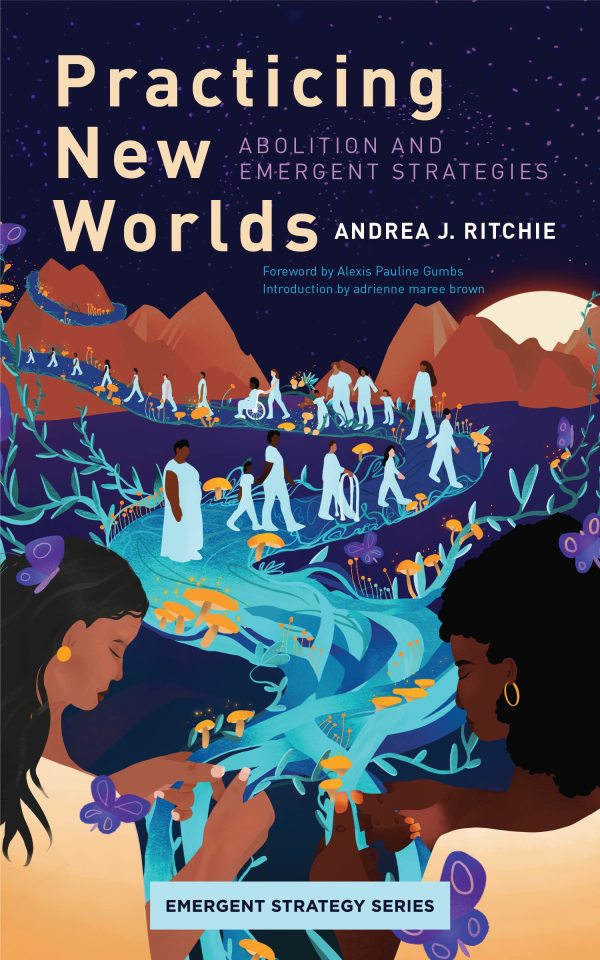
An exploration of how emergent strategies can help us meet this moment, survive what is to come, and shape safer and more just futures.
Practicing New Worlds explores how principles of emergence, adaptation, iteration, resilience, transformation, interdependence, decentralization and fractalization can shape organizing toward a world without the violence of surveillance, police, prisons, jails, or cages of any kind, in which we collectively have everything we need to survive and thrive.
Drawing on decades of experience as an abolitionist organizer, policy advocate, and litigator in movements for racial, gender, economic, and environmental justice and the principles articulated by adrienne maree brown in Emergent Strategy: Shaping Change, Changing Worlds, Ritchie invites us to think beyond traditional legislative and policy change to create more possibilities for survival and resistance in the midst of the ongoing catastrophes of racial capitalism—and the cataclysms to come. Rooted in analysis of current abolitionist practices and interviews with on-the-ground organizers resisting state violence, building networks to support people in need of abortion care, and nurturing organizations and convergences that can grow transformative cities and movements, Practicing New Worlds takes readers on a journey of learning, unlearning, experimentation, and imagination to dream the worlds we long for into being.
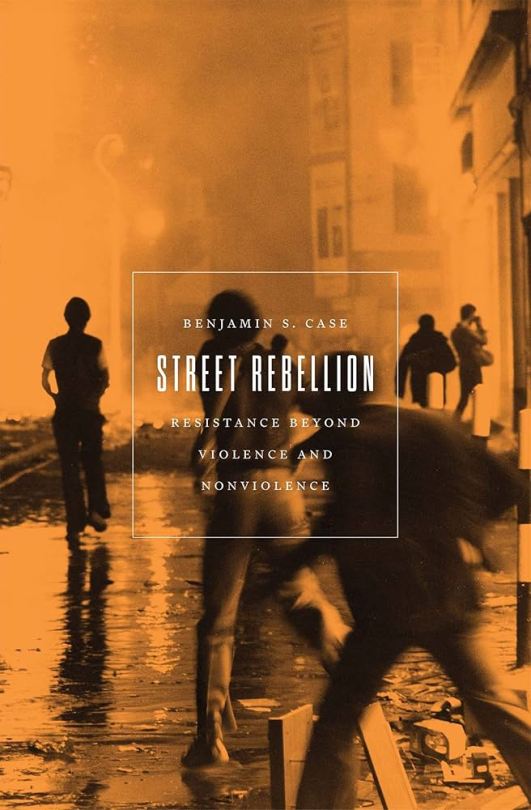
In a style that bridges the divide between academia and activism, Street Rebellion develops a broader and more accurate understanding of how people struggle for liberation.
We are living in a time of uprisings that routinely involve physical confrontation—burning vehicles, barricades, vandalism, and scuffles between protesters and authorities. Yet the Left has struggled to incorporate rioting into theories of change, remaining stuck in recurring debates over violence and nonviolence. Civil resistance studies have popularized the term “strategic nonviolence,” spreading the notion that violence is wholly counter-productive. Street Rebellion scrutinizes recent research and develops a broad and grounded portrait of the relationship between strategic nonviolence and rioting in the struggle for liberation.
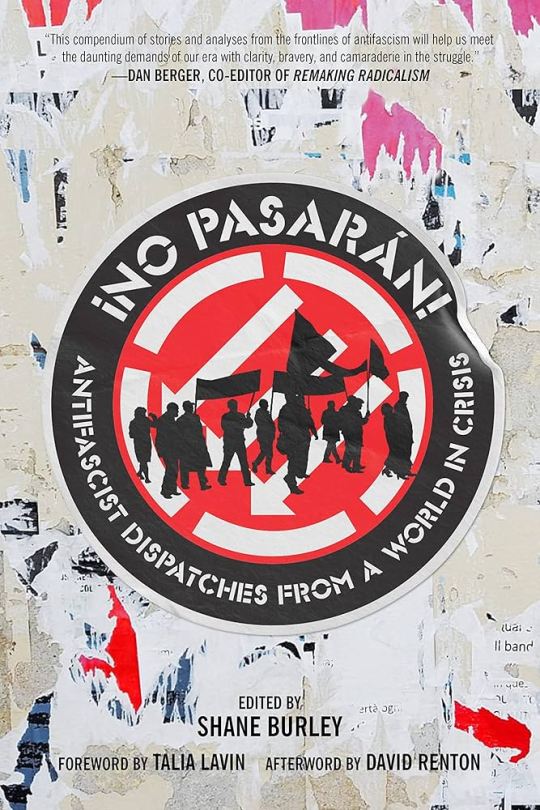
¡No Pasarán! is an anthology of antifascist writing that takes up the fight against white supremacy and the far-right from multiple angles. From the history of antifascism to today's movement to identify, deplatform, and confront the right, and the ways an insurgent fascism is growing within capitalist democracies, a myriad of voices come together to shape the new face of antifascism in a moment of social and political flux.
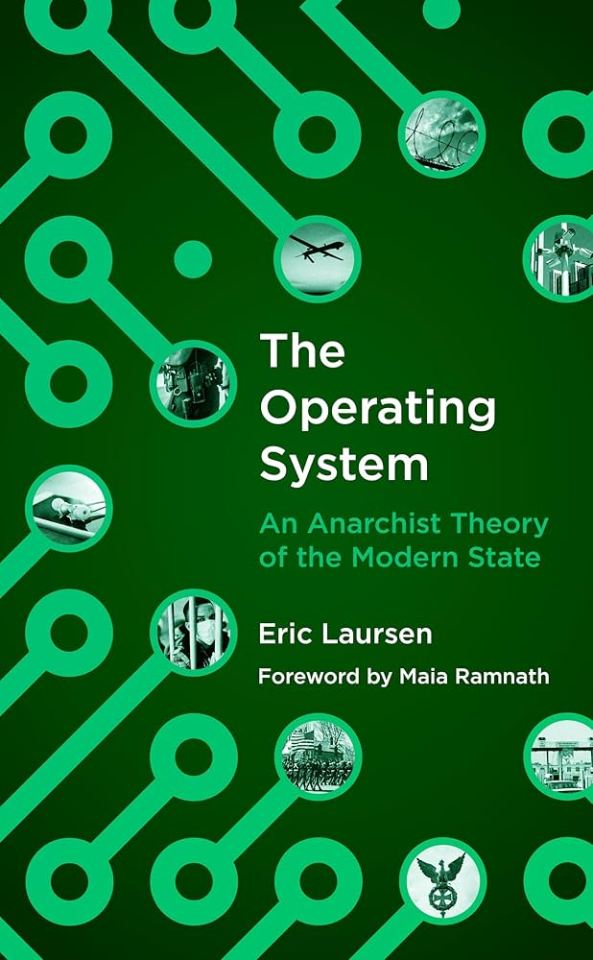
One of the most unique aspects of anarchism as a political philosophy is that it seeks to abolish the state. But what exactly is “the state”? The State is like a vast operating system for ordering and controlling relations among human society, the economy, and the natural world, analogous to a digital operating system like Windows or MacOS. Like a state, an operating system “governs” the programs and applications under it and networked with it, as well as, to some extent, the individuals who avail themselves of these tools and resources. No matter how different states seem on the surface they share core similarities, namely:
* The State is a relatively new thing in world history
* The State is European in origin and outlook
* States are “individuals” in the eyes of the law
* The State claims the right to determine who is a person
* The State is an instrument of violence and war
* The State is above the law
* The State is first and foremost an economic endeavor
Anyone concerned with entrenched power, income inequality, lack of digital privacy, climate change, the amateurish response to COVID-19, or military-style policing will find eye-opening insights into how states operate and build more power for themselves—at our expense. The state won’t solve our most pressing problems, so why do we obey? It’s time to think outside the state.

Joyful Militancy investigates how fear, self-righteousness, and moralism infiltrate and take root within liberation movements, what to do about them, and ultimately how tenderness and vulnerability can thrive alongside fierce militant commitment.
Why do radical movements and spaces sometimes feel laden with fear, anxiety, suspicion, self-righteousness, and competition? Montgomery and bergman call this phenomenon rigid radicalism: congealed and toxic ways of relating that have seeped into social movements, posing as the “correct” way of being radical. In conversation with organizers and intellectuals from a wide variety of political currents, the authors explore how rigid radicalism smuggles itself into radical spaces, and how it is being undone
Interviewees include Silvia Federici, adrienne maree brown, Marina Sitrin, Gustavo Esteva, Leanne Betasamosake Simpson, Walidah Imarisha, Margaret Killjoy, Glen Coulthard, Richard Day, and more.
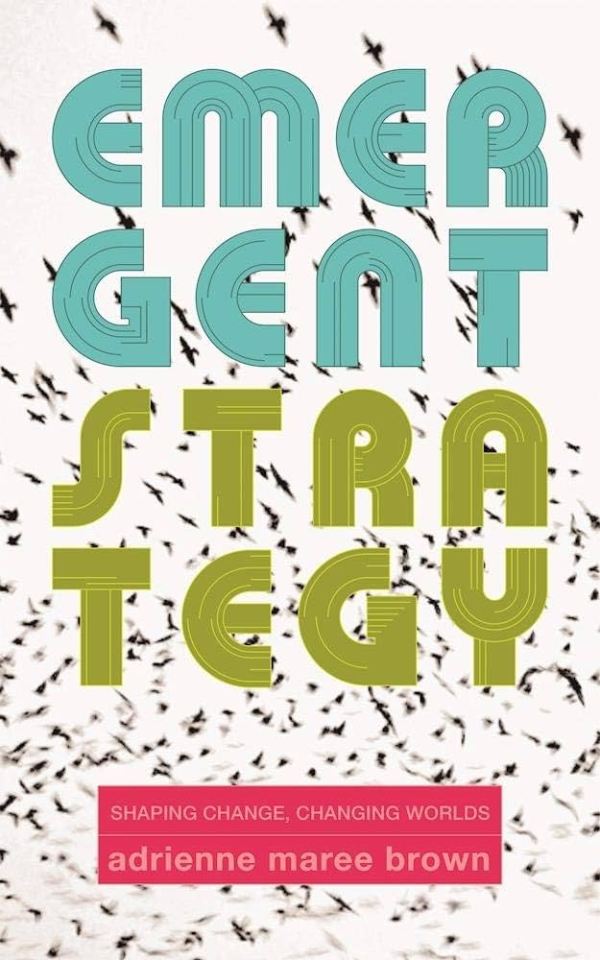
Self-help, society-help, and planet-help to shape the futures we want. A resolutely materialist spirituality based equally on science and science fiction: a wild feminist and afro-futurist ride!
Inspired by Octavia Butler's explorations of our human relationship to change, Emergent Strategy is radical self-help, society-help, and planet-help designed to shape the futures we want to live. Change is constant. The world is in a continual state of flux. It is a stream of ever-mutating, emergent patterns. Rather than steel ourselves against such change, this book invites us to feel, map, assess, and learn from the swirling patterns around us in order to better understand and influence them as they happen. This is a resolutely materialist “spirituality” based equally on science and science fiction, a visionary incantation to transform that which ultimately transforms us.
20 notes
·
View notes
Text
💫 Join the Fediverse! 💫
Greetings, fellow bloggers! We welcome you to join us in discovering, honoring, and promoting the potential future of social networking—commonly referred to as the "Fediverse."
The Fediverse, or Federation Universe, refers to a collective of online platforms that utilize the web protocol known as ActivityPub, which has set a standard of excellence in regards to both protecting and respecting users' online privacies.
There's a good chance in the past few years that you've caught wind of the fedi family's critically acclaimed Mastodon; however, there are many other unique platforms worth your consideration...
✨ Where To Begin?
Conveniently enough, from the minds of brilliant independent developers, there already likely exists a Fediverse equivalent to your favorite socials. Whether it's an opinion from the critics, or from the community alike—the following popular websites are commonly associated with one another:
Friendica 🐰 = Facebook Mastodon 🐘 = Twitter Pixelfed 🐼 = Instagram PeerTube 🐙 = YouTube Lemmy 🐭 = Reddit
It's worth mentioning, too, a few other sites and forks thereof that are worthy counterparts, which be: Pleroma 🦊 & Misskey 🐱, microblogs also similar to Twitter/Mastodon. Funkwhale 🐋 is a self-hosting audio streamer, which pays homage to the once-popular GrooveShark. For power users, Hubzilla 🐨 makes a great choice (alongside Friendica) when choosing macroblogging alternatives.
✨ To Be Clear...
To address the technicalities: aside from the "definitive" Fediverse clients, we will also be incorporating any platforms that utilize ActivityPub-adjacent protocols as well. These include, but are not limited to: diaspora*; AT Protocol (Bluesky 🦋); Nostr; OStatus; Matrix; Zot; etc. We will NOT be incorporating any decentralized sites that are either questionably or proven to be unethical. (AKA: Gab has been exiled.)
✨ Why Your Privacy Matters
You may ask yourself, as we once did, "Why does protecting my online privacy truly matter?" While it may seem innocent enough on the surface, would it change your mind that it's been officially shared by former corporate media employees that data is more valuable than money to these companies? Outside of the ethical concerns surrounding these concepts, there are many other reasons why protecting your data is critical, be it: security breaches which jeopardize your financial info and risk identity theft; continuing to feed algorithms which use psychological manipulation in attempts to sell you products; the risk of spyware hacking your webcams and microphones when you least expect it; amongst countless other possibilities that can and do happen to individuals on a constant basis. We wish it could all just be written off as a conspiracy... but, with a little research, you'll swiftly realize the validity of these claims are not to be ignored any longer. The solution? Taking the decentralized route.
✨ Our Mission For This Blog
Our mission for establishing this blog includes 3 core elements:
To serve as a hub which anybody can access in order to assist themselves in either: becoming a part of the Fediverse, gaining the resources/knowledge to convince others to do the very same, and providing updates on anything Fedi-related.
We are determined to do anything within our power to prevent what the future of the Internet could become if active social users continue tossing away their data, all while technologies are advancing at faster rates with each passing year. Basically we'd prefer not to live in a cyber-Dystopia at all costs.
Tumblr (Automattic) has expressed interest in switching their servers over to ActivityPub after Musk's acquisition of then-Twitter, and are officially in the transitional process of making this happen for all of us. We're hoping our collective efforts may at some point be recognized by @staff, which in turn will encourage their efforts and stand by their decision.
With that being stated, we hope you decide to follow us here, and decide to make the shift—as it is merely the beginning. We encourage you to send us any questions you may have, any personal suggestions, or corrections on any misinformation you may come across.
From the Tender Hearts of, ✨💞 @disease & @faggotfungus 💞✨
#JOIN THE FEDIVERSE#fediverse#decentralization#internet privacy#social media#social networks#FOSS#activitypub#mastodon#fedi#big data#degoogle#future technology#cybersecurity#technology#essential reading
37 notes
·
View notes
Text
Enter the FujoVerse™

Starting 2024's content creation journey with a bang, it's time to outline the principles behind the FujoVerse™: an ambitious (but realistic) plan to turn the web back into a place of fun, joy, and connection, where people build and nurture their own communities and software. (You can also read the article on my blog)
The Journey
As those who follow my journey with @bobaboard or read my quarterly newsletter (linked in the article) know, the used-to-be-called BobaVerse™ is a collection of projects I've been working on since 2020 while pondering an important question: how do we "fix" the modern social web?

Obviously the joyless landscape that is the web of today is not something a single person can fix. Still, I loved and owed the internet too much to see it wither.
After countless hours of work, I found 3 pillars to work on: community, software ownership and technical education.
Jump in after the cut to learn more about how it all comes together!
Community
Community is where I started from, with good reason! While social networks might trick us into thinking of them as communities, they lack the characteristics that researchers identify as the necessary base for "true community": group identity, shared norms, and mutual concern.
Today, I'm even more convinced community is a fundamental piece of reclaiming the web as a place of joy. It's alienating, disempowering, and incredibly lonely to be surrounded by countless people without feeling true connection with most of them (or worse, feeling real danger).

Software Ownership and Collaboration
As I worked with niche communities "software ownership" also became increasingly important to me: if we cannot expect mainstream tech companies to cater to communities at the margins, it follows that these communities must be able to build and shape their own software themselves.
Plenty of people have already discussed how this challenge goes beyond the tech. Among many, "collaboration" is another sticking point for me: effective collaboration requires trust and psychological safety, both of which are in short supply these days (community helps here too, but it's still hard).

Education (Technical and Beyond)
As I worked more and more with volunteers and other collaborators, however, another important piece of the puzzle showed itself: the dire state of educational material for non-professional web developers. How can people change the web if they cannot learn how to *build* the web?
(And yes, learning HTML and CSS is absolutely important and REAL web development. But to collaborate on modern software you need so much more. Even further, people *yearn* for more, and struggle to find it. They want that power, and we should give it to them.)
Once again, technical aspects aren't the only ones that matter. Any large-scale effort needs many skills that society doesn't equip us with. If we want to change how the web looks, we must teach, teach, TEACH! If you've seen me put so much effort into streaming, this is why :)
And obviously, while I don't go into them in this article, open source software and decentralized protocols are core to "this whole thing".

The Future
All of this said, while I've been working on this for a few years, I've struggled to find the support I need to continue this work. To this end, this year I'm doing something I'm not used to: producing content, gaining visibility, and putting my work in front of the eyes of people that want to fight for the future of the web.
This has been a hard choice: producing content is hard and takes energy and focus away from all I've been doing. Still, I'm committed to doing what it takes, and (luckily) content and teaching go hand in hand. But the more each single person helps, the less I need to push for wide reach.
If you want to help (and read the behind the scenes of all I've been working on before everyone else), you can subscribe to my Patreon or to my self-hosted attempt at an alternative.

I deeply believe that in the long term all that we're building will result in self-sustaining projects that will carry this mission forward. After all, I'm building them together with people who understand the needs of the web in a way that no mainstream company can replicate.
Until we get there, every little bit of help (be it monetary support, boosting posts, pitching us to your friends, or kind words of encouragement and support) truly matters.
In exchange, I look forward to sharing more of the knowledge and insights I've accrued with you all :)

And once again, to read or share this post from the original blog, you can find it here.
#bobaboard#fujoguide#freedom of the web#decentralized protocols#community#social networks#the great content creationing of 2024
88 notes
·
View notes
Text
Early MCYTblr Interviews: umbie
today's interviewee is umbie, who was a member of ebblr from march 2021 onwards. i would like to once again ask everyone to remain impartial and respectful-- this blog is a place for all MCYTblr history, which includes parts of the fandom that were more controversial. that said, let's begin!
Q: Since I realize not everyone knows-- would you mind explaining what exactly ebblr was, to the best of your ability?
A: Ebblr is an abbreviation for Enderbees Tumblr. It existed as a network of undiscoverable blogs where folks shipped and truthed beeduo romantically. It ebs truthing started at the beginning of 2021, late 2020 on plate's blog gayminecraftmen, who you did an interview with, then moved to jason's blog on mcytruth, and later decentralized into a collection of blogs rather than being headed by any one person. It also became a place to discuss mcyt shipping and truthing in general- we didn't ship minors with adults, but things like techza, techbur, benchtrio shipping. character or irl, we didn't discriminate. The core of it was ebs, though.
There was also stuff like neurodiversity and gender truthing. really anything thats gauche to talk about on main.
Q: What was your general experience in MCYTblr? What was your general experience in ebblr specifically?
A: Mcytblr was very... enveloping, is how i'd put it. Easily the strongest hyperfixation i've ever had. It was also pretty frustrating at times. 2021 ebs was the height of the /p era, when the characters were off getting minecraft-married and the outside fandom insisted on them being platonic. We felt crazy. Ebblr started from blogs like mcytruth and gayminecraftmen, but I think the reason it blossomed into its own independent community was because ebblr addressed a need that mainblr, at the time, did not. I think it's facinating how in hindsight the fandom has ever so slowly turned around on the romantic c!beeduo, and now it's just kinda normal.
Being in ebblr was rewarding and enriching, but also very anxiety-inducing. We had pretty strict rules around interaction- keep your blog invisible, no cishets (lol), no nsfw, no outside reblogs. It started about after the first blocklist as a way of avoiding harassment, but developed into a moral thing later on. We existed in a kind of grey area where we understood that what we were doing was weird, but we wanted to be as inobtrusive as possible. In the early days, i made an effort to follow everybody. The community was that close-knit. Whenever a member of Ebblr accidentally reblogged an ebblr post to their mainblog, i would hop onto an alt and message whoever I needed to clean up the leak so none of our posts escaped.
Q: In critblr and dreamlying, there was a culture of "doxxing", or otherwise finding personal information about creators. Was that also true for ebblr?
A: Nope! That's one of the primary differences between critblr, dreamlying, and Ebblr. One of our rules was to keep our posting limited to things the creators released on purpose. That didn't stop us from being invasive, though. We diligently kept records of our "proof." We would obsess over details, and considered anything said on social media, stream, or twitter space fair game, even if better judgment was that they're not things the content creators would want talked about. It wasn't a monolith. A lot of folks didn't truth at all, and only wanted a space to post art or fics of pairings that were unacceptable on main. I also tracked planes during the meetup times, but jury's still out on whether that constitutes doxxing. I also had enough sense not to post about it directly. While most of us were uncomfortable with outright doxxing and distanced ourselves from those who did, we sure could walk the line.
Q: You said in your initial messages that you coined the term "critblr". Could you elaborate on that?
A: Dlying existed before ebblr, but Critblr did not! Critblr started out as a subsect of ebblr.
Critblr was conceived of in a discord server i shared with a couple friends that joined at the same time as me! It was meant to exist as a solution to formalize a growing rift within ebblr. There were blogs that were more involved in things like discussing doxxes and criticizing content creators and mainblr/maintwt opinions, and there were folks who were exclusively interested in shipping and/or truthing. Ebblr was upset with negativity and complaining, and the blogs who would become critblr didn't care for the shipping. It started as a place where you could discuss things you couldn't discuss on main, but people's needs became different. I remember the poll to name it. I suggested and vouched for critblr. Since the server's been since deleted, you're unfortunately just gonna have to take my word for it, but i'm part of the reason it's not called truthblr and I'm proud of that.
Q: This has actually been really clarifying for me; I knew ebblr and critblr were similar and intertwined, but I didn't know the specifics! I suppose, knowing that, what are some things that you remember about critblr in specific?
A: i understood critblr as a sort of anti-mcytblr. whatever opinion was widespread and popular on main, critblr was the place where you could find someone with the opposite opinion. it was a haven of haters, trolls and gossips, and it was really fucking funny. they loved having rivals- back in the summer of 2021, they/we had a "war" with fltwt. (at least in terms of what jason was up to. i have no idea how its developed now.)
honestly a lot more of the ire of critblr was directed at mcyttwt than it was on the ground at mcytblr. (although in 2021 the boundary between critblr and ebblr was still pretty loose and even as an ebblr main i was aware of all this, i'll say critblr for ease of communication)
another note about eb-critblr. it was extremely white. some of the rhetoric bouncing around on critblr at the time was kind of in the vein of "arent these twitter kids so sensitive for being upset with schlatt"
i think i also want to make point about how a lot of the truthing was kinda unserious. sometimes people dont have clips or evidence or info sometimes truthing was just projecting onto a content creator and feeling it in your heart. The instinct to truth, i think, came from a place of wanting to relate to the streamers. See yourself in them, their relationships, and their mental struggles. still, It was soaked in irony- there was this sort of untouchable jester attitude, and the less seriously you took yourself, the better. I think people cared a lot, though, and that ended up being the problem. There was a lot of pressure to be certain, which is fascinating coming from a space built on speculating on incomplete info. im sure other people in ebblr had very different experiences than I.
Q: Would you mind explaining what fltwt was?
A: fltwt came into being in summer 2021, when ranboo got doxxed. jason mcytruth had already stopped caring about ebs by now, so most of his and his associate's energy went into researching, exposing, and clowning them.
you need to understand that they were like. an abberation to us. we had been doing good honest truthing and shipping in our private corner since the new years, and here these twitter chucklefucks were throwing doxxes around and using them to truth with. they were like our evil twin. we hated them so much.
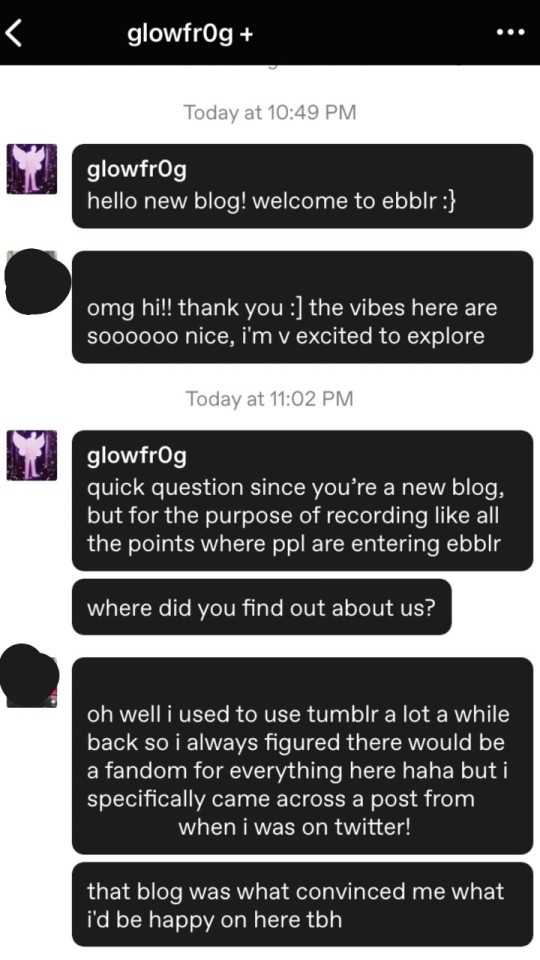
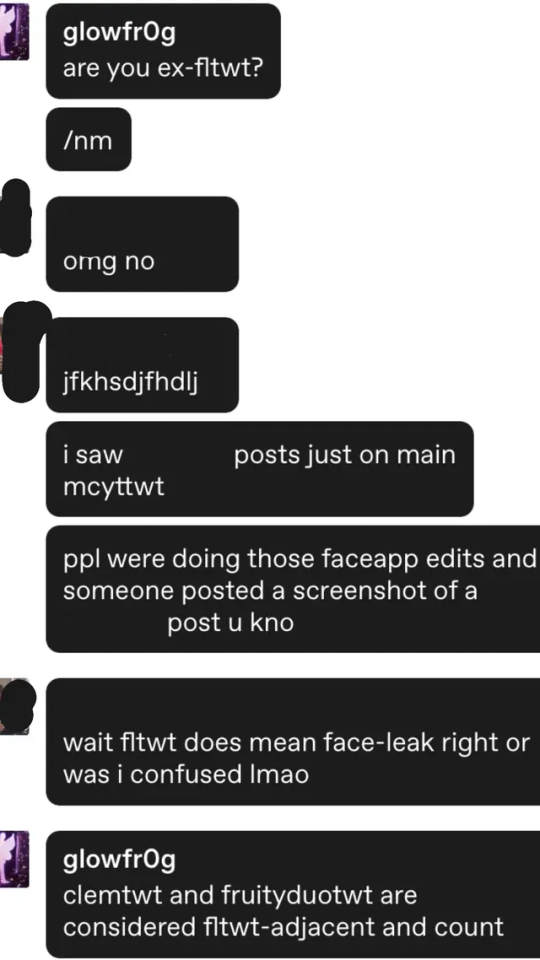
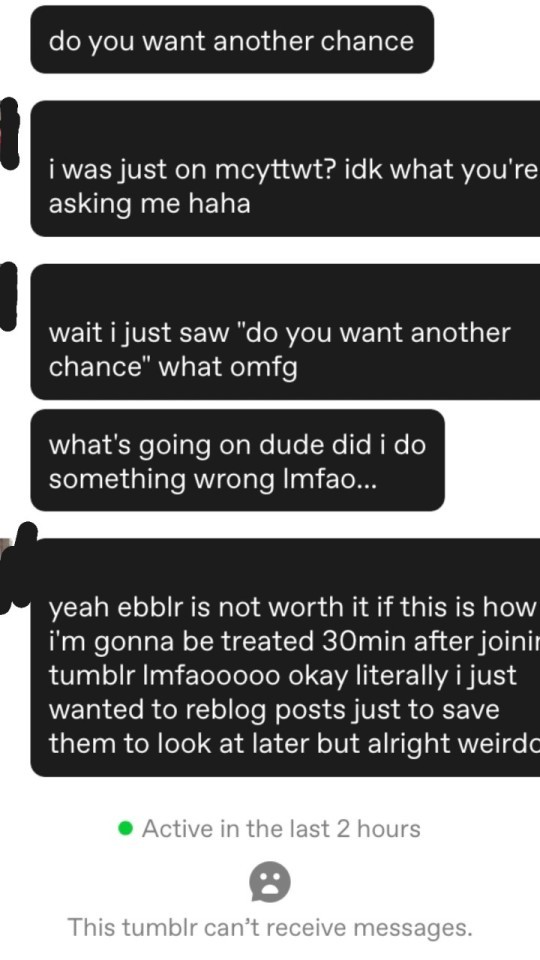
[all names have been redacted for privacy]
the reason my url is glowfr0g in this is because i changed my url after this interaction, but i have screenshots with my url as umbie aswell. we were SERIOUS.
since beeduo stopped hanging out like a week into the summer because of the doxx, the truthing in the community diversified a lot. one of such truthings was Clemtruthing- or transfeminine tommy truthing. fltwt straight up stole this from us, screenshotting and circulating our posts, and now theyre more known for it than we were. the blog mentioned here, [REDACTED], deactivated over this.
i think at one point fltwt was doing a popularity tournament and mcytruth was entered in as a contestant? but what i did here was hardly the only example of eb-critblr butting heads with fltwt. the demographic was largely bored twitter ranboo fans. yknow the "im literally neurodivergent and a minor" meme? that was popularized because of THEM. also that text interaction is dated july 30 2021
fltwt was, partially private i think? but overall not well organized at all and a lot of people on there were attention seeking. i have no idea how much these subtwts were actually invested in ebblr or critblr, for all i know it was extremely one-sided
Q: Was it an interesting experience to be in a niche community that regularly experienced "containment breaches" and blocklists? How did that affect the community's growth?
A: I kinda appointed myself the manager of the containment breaches! I had a whole process. If a mainblr blog reblogged a post, i would contact them on my umbie blog. Since they reblogged it, they were probably a lurker and i could ask them directly to take it down. However, if any of the mainblr blog's mutuals reblogged a post, i would contact them on an alt instead from the perspective of a concerned bystander that just wanted you to know that you had accidentally reblogged one of those posts from those weird shippers. Worked every time. I took pride in it.
There were really only a few blocklists? The first blocklist, what most people would know ebblr from back in the early days, got ebblr so much attention that's how most of the folks within it found out about it (including myself.) There were one or two scares after that, but nothing serious. I only ever got on one, and that one wasn't shared publicly. We still made a big show about having everyone temporarily change urls though. We didn't really want to be well known. Anybody who knew about ebblr understood that it was for the best of both communities if people kept quiet.
Q: How did the "boundaries" discourse affect your community?
A: we danced around with boundaries. Back when we were making fun of main for platonic marriage, a lot of us were loud about the fact that neither of them had called it a platonic marriage until the fans started doing it. We weren't technically breaking any stated boundaries, but i think part of why we were so loud about it is because we knew on some level that it was a cope. When the boundaries were finally stated and the truth that we were being weird all along was unavoidable, it was fucking DEFCON 1. A lot of people left ebblr over it, and a lot of people were like "wait, you didn't know we were breaking boundaries?" The community had boundaries, but they were not the same boundaries as the content creators.
Q: Were you ever involved in any main MCYTblr events?
A: nope. we wanted nothing to do with main mcytblr. We stayed aware, though, and made fun of them whenever things went sour.
Q: Do you think being in ebblr was an overall positive or negative experience?
A: mixed. so mixed. so incredibly mixed. The anxiety of me or my friends getting exposed or discovered kept me up at night. I was constantly conflicted about whether or not i was doing the right thing while also reassuring people that we definitely were. Our proximity to the darkest parts of minecraft fandom means i've seen and learned things that I wish I hadn't. When Beeduo went no contact it was uh. It Was Bad. It Felt Bad. We Felt bad, and I felt partially responsible. it's hard to know if that's true.
At the same time, I've met some of my best friends on there, ones that I keep in contact with to this day! Being on ebblr taught me a lot of critical thinking- I now understand that twitter isnt right about everything always. Being known and liked as Umbie helped me safely built up a sense of identity there that has brought me into the best chapter of my life so far, and experimenting with pronouns was also really really nice. For all the late nights and callout posts and blocklists and moralism and bullshit, i think i will be chasing the high of the vindication that i got when ranboo came out on twitter for the rest of my life.
You can call us a lot of things, but you can't call us incorrect on that front, and as truthers go, that's kinda rare.
[umbie was kind enough to also send me the following image-- this is the "enderbees" flag, seen in the yellow/purple rainbow, as it appeared on Karl Jacobs's stream of 2022 r/place! You can also spot the L'manburg flag, the Snowchester flag, and one more I can't identify.]
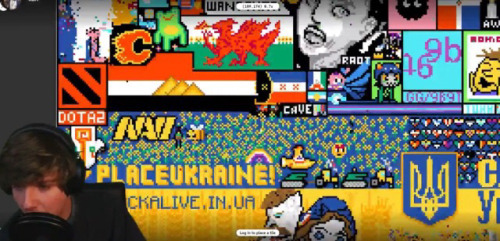
16 notes
·
View notes
Text
What #AustraliaFires Taught Us About Digital Citizenship!
Week 6: What is Digital Citizenship? Hashtag Publics, Political Engagement and Activism


HELLO!! Welcome back to my Tumblr this week! Before this week's topic, I'd like to ask you a question. What types of social media platforms do you usually use? And do you frequently use hashtags (#)? For example, hashtags like #fyp (For You Page) are very commonly used on media platforms we consume on a daily basis, such as TikTok and Instagram. In today's world, influencers and celebrities actively use them to share information and spread trends. By the way, I used to use them a lot when I was in high school, but now... I don't use them at all, lol. ;-) In this context, where social media has become deeply intertwined with our lives, the concept of “being a citizen” no longer stops at voting or community activities but extends to our behavior in the digital space. In this context, the concept of Digital Citizenship emerges as the theme of this discussion. Ribble (2008) defines Digital Citizenship as “the norms governing appropriate and responsible behavior in the use of technology.” This goes beyond simply adhering to online etiquette, encompassing how we interact with others and participate in society.
Furthermore, Ribble (2008) argues that simply imparting knowledge is insufficient for developing appropriate behavior as digital citizens, and that a practical learning process within daily life is necessary. To address this, he proposes a model called the Four-Stage Cycle.
The four stages are
Awareness: First, understanding what is appropriate
Guided Practice: Learning through practice in a safe environment
Modeling and Demonstration: Learning by observing good examples
Feedback and Analysis: Reflecting on one's actions and making improvements
In other words, this is an “endless cycle of learning” for living in a digital society alongside others, and we must continuously engage in re-learning and rethinking alongside technology.
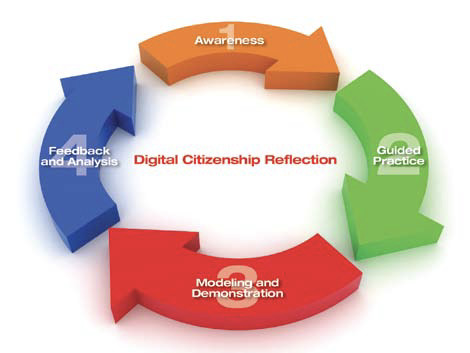
Next, according to Rambukkana (2015), hashtag publics are temporary, decentralized discursive networks formed through shared hashtags, where people connect, raise their voices, and sometimes bring about change within social, cultural, and political contexts. Hashtag publics spread not only on Twitter but also to other media spaces such as Facebook and Instagram.
youtube

These emerged as actual social participation during the 2019 – 2020 Australian bushfire crisis. On social media, hashtags such as #AustralianBushfires, #AustralianFires, and #supportingaustralia spread rapidly around the world, with users worldwide calling for donations, sharing information about the situation on the ground, and sending political messages (Mack, 2020). Personally, although I used a slightly different hashtag, I shared information and calls for action related to the fires on Instagram, including #savetheaustralia. Many celebrities, including PINK and Russell Crowe, made donations to support the fire relief efforts.
On the other hand, the sharing of fake news and unverified misinformation, whether intentional or not, is not new on the internet. On Twitter (now X), hashtags such as #ArsonEmergency were used to spread false claims that the bushfires in Australia were caused by arson (Fukuda, 2020). However, as the backlash and misinformation spread, people began to challenge fake stories by sharing links in comment sections, fact-checking, and correcting claims (Mack, 2020). The attitude of confirming the accuracy of information and posting with consideration for others is consistent with Ribble's definition of appropriate and responsible use of technology. In this way, actions taken through hashtags are not merely “online hype” but have important meaning as a form of modern civic participation. Additionally, the fact that celebrities and influencers led support activities for environmental protection groups exemplified “digital citizenship leadership.” As a result, as Ribble emphasizes with Digital Citizenship in mind, it is important to continue an endless cycle of learning for coexistence with others, as he proposes in his Four-Stage Cycle.
References:
Fukuda, N. (2020, January 29). 深刻なオーストラリア森林火災のウラで起きた「デマ拡散と火消し」. 現代ビジネス. https://gendai.media/articles/-/69997?page=2
Mack, C. (2020, May 27). Social Media: Engaging the World in Australia’s Bushfire Crisis. Paper and Spark Digital. https://paperandspark.com.au/social-media-engaging-the-world-in-australias-bushfire-crisis/
Rambukkana, N., & ProQuest issuing body. (2015). Hashtag publics : the power and politics of discursive networks (N. Rambukkana, Ed.). Peter Lang.
Ribble, M. (2008). Passport to Digital Citizenship. Learning & Leading with Technology, 36(4), 14–17.
2 notes
·
View notes
Text

The Free Our Feeds initiative aims to build off of Bluesky’s core technology, the Authenticated Transfer (AT) protocol, a new shared language that computer servers use to communicate with each other. Using this technology — which is still backed by Bluesky, a private company — the campaign hopes to create a decentralized social media network free of oligarchical oversight. That’s also something Bluesky’s Chief Executive Officer Jay Graber said she supports.
“ [Free Our Feeds] is trying to take Bluesky’s essential infrastructure and make it so that it becomes a separate thing that is un-tamperable and un-ownable,” Kramer explained.
New_ Public is led by co-directors Deepti Doshi and Eli Pariser, who are also two of the nine technical advisors, also known as “custodians,” spearheading the Free Our Feeds campaign. Over the next three years, they seek to fundraise $30 million to develop this new social media network, which would be overseen by a public-interest foundation in an effort to ensure that the AT protocol would remain open.
[ article ]
#free our feeds#bluesky#social media networks#new_public#i am not knowledgeable about this stuff#what do ppl think of this? i'm interested in opinions
6 notes
·
View notes
Text
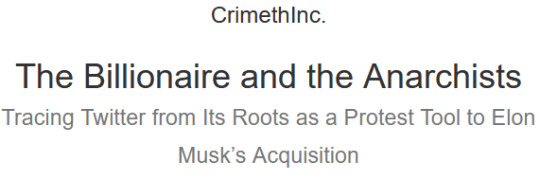
Innovation and Cooptation
With Musk’s purchase of Twitter, we see the conclusion of a cycle of innovation and cooptation in the field of communications. In the late 20th century, the dominant political and technological models were monolithic and unidirectional: network television, mass-based political parties. In response, anarchists and other rebels experimented with independent media and underground networks, producing innovative horizontal and decentralized models like indymedia.org. Tech corporations eventually monetized these models as the participatory media of Web 2.0, such as Facebook. Yet from the turn of the century through the uprising of 2020, the lingering horizontal and participatory aspects of the internet in general and social media in particular continued to empower those who sought to achieve more self-determination—witness the “Thank you Facebook” graffiti in Tunisia after the so-called “Arab Spring” uprisings of 2010-2011.
Over the past decade, however, corporations and governments have introduced more and more online surveillance and control. Musk’s acquisition of Twitter is the latest stage in a reactionary clampdown with grim implications.
Musk and his colleagues see capitalism as a meritocracy in which the shrewdest and most hardworking competitors inexorably rise to the top. Hence, presumably, their own success.
Of course, if Musk wishes to prove that his success is not just the consequence of privilege and luck—of fortune and good fortune—he could demonstrate this easily enough by giving away his wealth, cutting his social ties, changing his name, and repeating his supposed rags-to-riches feats a second time. If he were able to climb the pyramid a second time without the benefit of growing up white in apartheid-era South Africa (setting aside the question of his father’s emerald investments for now), we might have to grant a hearing to his claims that the market has elevated him on account of his personal qualities—though that still would not show that capitalism rewards the efforts that are most beneficial for humanity.
According to the Silicon Valley narrative, platforms like Twitter are the inventions of individual entrepreneurs, propelled into being by the finance capital of canny investors.
But Twitter did not simply spring, fully formed like Athena, from the head of company co-founder Jack Dorsey. In fact, it was a modest refinement of a model already demonstrated by TXTmob, the SMS text messaging program developed by the Institute for Applied Autonomy for protests at the 2004 Democratic and Republican National Conventions.[1] Blaine Cook and Evan Henshaw-Plath, anarchist developers who worked alongside Dorsey at his previous company Odeo, helped refine TXTmob and later took the model with them into the conversations with Dorsey that gave rise to Twitter.[2]
If the unrelenting urgency of social media in general and Twitter in particular can be exhausting, that’s to be expected—the infrastructure of Twitter was originally designed for street communications during high-stakes mass mobilizations in which information must go out immediately, boiled down to its bare essentials. It’s not a coincidence that, despite its shortcomings, the platform has continued to be useful to street activists and conflict journalists.
The point here is that innovative models do not necessarily emerge from the commercial entrepreneurism of the Great Men of history and economics. More often, they emerge in the course of collective efforts to solve one of the problems created by the capitalist order. Resistance is the motor of history. Afterwards, opportunists like Musk use the outsize economic leverage that a profit-driven market grants them to buy up new technologies and turn them definitively against the movements and milieux that originally produced them.
We can identify two stages in the capitalist appropriation of the TXTmob model. In the first phase, a framework that was originally designed by volunteers for the use of ordinary protesters was transformed into a publicly traded corporation, around the same time that the open spaces of the early internet were being colonized by the for-profit surveillance systems of Web 2.0. In the second phase, this publicly traded corporation has been transformed into the private plaything of a single entitled tycoon—with consequences that remain to be seen.
Musk claims that his goal is to open up the platform for a wider range of speech. In practice, there is no such thing as “free speech” in its pure form—every decision that can shape the conditions of dialogue inevitably has implications regarding who can participate, who can be heard, and what can be said. For all we might say against them, the previous content moderators of Twitter did not prevent the platform from serving grassroots movements. We have yet to see whether Musk will intentionally target activists and organizers or simply permit reactionaries to do so on a crowdsourced basis, but it would be extremely naïve to take him at his word that his goal is to make Twitter more open.
#elon musk#the muskrat#twitter#xitter#social media#billionaires#anarchism#revolution#climate crisis#ecology#climate change#resistance#community building#practical anarchy#practical anarchism#anarchist society#practical#daily posts#communism#anti capitalist#anti capitalism#late stage capitalism#organization#grassroots#grass roots#anarchists#libraries#leftism#social issues#economy
7 notes
·
View notes